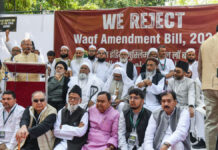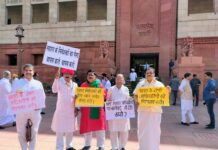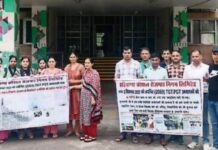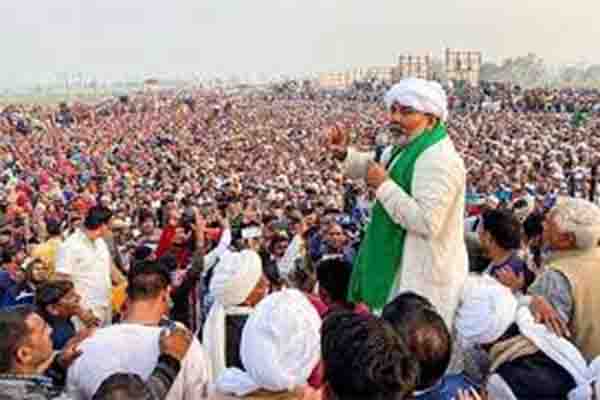Prem Singh
I have written five-six articles on the unprecedented farmers movement organised under the aegis of the Samyukt Kisan Morcha (SKM) against the three agricultural laws. Therefore, to avoid repetition, this short comment.
The peasant movement was kept apolitical in the sense that the leaders of any political party were not allowed to use the platform of the movement. However, the opposition parties/leaders supported the movement and tried to win the sympathy of the farmers so that they could take electoral advantage of the farmers’ resentment against the government/BJP. In view of the simultaneous assembly elections in five states, the government abruptly withdrew the agri-laws, without further discussions with farmer leaders. This move of the government is a proof that the movement had the potential to create political influence against the ruling party. Especially in Punjab, Haryana and Uttar Pradesh.
Uttar Pradesh is a large state with 403 assembly constituencies. The election pundits talk about the decisive impact of the farmers movement in 70 seats in western Uttar Pradesh, and not in the entire state. Punjab is a smaller state with 117 assembly seats compared to Uttar Pradesh. But the impact of the peasant movement is here is state-wide. The farmers of Punjab played an important role not only in terms of the rise, conduction and success of the farmers movement, but also in terms of a clear understanding of the neoliberal economic policies, responsible for the labour and agrarian laws. In fact, the small and big farmers of Punjab were convinced that because of these laws their land and farming would go out of their hands to the corporate houses. And they will remain subordinate of them. They were really scared of this outcome of the agri-laws. Children, adults, women – all. They marched to Delhi gearing up for a long struggle against the laws and the government that legislated them.
The electoral scenario of Punjab is in front of the people, in which 28 farmers’ organizations, which have been the constituents of Samyukt Kisan Morcha, are also in the electoral fray under the banner of Samyukta Samaj Morcha. Farmers’ organizations have decided to enter the election-battle very late and without proper preparations. It seems unlikely that this coalition of farmer organizations will be able to make any effective intervention in the multi-cornered elections. Nevertheless, if some of the Samyukta Samaj Morcha candidates win, it will be considered a direct victory over the neoliberal policies.
It is no secret that the Congress government in Punjab, of which Captain Amarinder Singh was the chief minister, had a consistent support to the farmers movement. Had the Captain remained with the Congress after being removed from the chief minister’s post, and the Congress would have been the biggest beneficiary of the peasant movement, then the Congress could be pressurized against neo-liberal economic policies in the future. That would have been an achievement of the peasant movement to some extent but in the right direction. But the 80-year-old Captain, who claims to be humiliated by the Congress High Command, is contesting the elections with the BJP by forming a new party. Now defeating Navjot Singh Sidhu in the assembly elections is the only goal of his long political career! Captain’s newly formed Punjab Lok Congress has an alliance with the BJP which imposed the agri-laws. By doing so, Captain has stood against the core spirit of the farmers movement. If he thinks that the government, by withdrawing the agri-laws, has abandoned the neoliberal policies behind them, then it is not so. Days after withdrawing the agri-laws, the government has stated that it has not given up. It will bring the agri-laws again. The budget that came after the farmers movement has once again given a clear message that the government is moving fast on the path of liberalization-privatization without any hesitation.
In Punjab, the BJP had a long-standing alliance with the Shiromani Akali Dal (SAD) against the Congress. The BJP would like the Aam Aadmi Party (AAP) to be benefitted against the Congress and the Shiromani Akali Dal, which left the BJP-led National Democratic Alliance (NDA) after the agri-laws were passed in Parliament. It is being said that the pro-BJP voters of the urban middle class of Punjab have sided with AAP. To break the Akali-Congress supremacy in Punjab politics, AAP has the support of radical Sikhs residing in Punjab and settled abroad from the very beginning. Along with spreading consciousness against the neoliberal policies, the peasant movement has also done a great job of promoting communal harmony. Obviously, all this manoeuvring of Captain, BJP, AAP is against the basic spirit of the farmers movement. Otherwise too, AAP, which supported the agri-laws, tried to encircle the agitating farmers, who reached the Delhi border in November 2020, at Burari Maidan along with the central government by preventing them from going to Ramlila Maidan/Jantar Mantar.
It is meant to say that the peasant movement went on for more than a year even in the face of all kinds of phantom obstacles. If only the politics of neo-liberal policies emerges victorious from its womb, then it is a matter of serious concern. The leadership of the peasant movement should think honestly towards the creation of a new politics. Like the peasant movement, it will be a long and sustained struggle.
(The author is a former Delhi University teacher and Fellow at Indian Institute of Advanced Study, Shimla)Politics of the farmers movement!




























